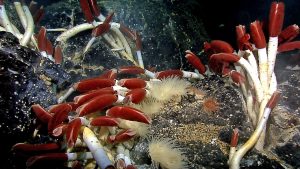PhD – Bacterial symbiosis in deep-sea annelids
Posted by Jose M. Martin-Duran, on 11 March 2019
Closing Date: 15 March 2021
Background
Mutualistic relationships between bacteria and complex organisms have repeatedly evolved and this has allowed host organisms to exploit new environments and foods. One of the most extreme and fascinating cases of symbiosis in the animal kingdom is observed in annelid worms of the genus Riftia and Osedax. These animals are able to live in particularly extreme environments, including deep sea hydrothermal vents and carcases thanks to bacteria from the environment that they acquire as juveniles. Ultimately, this induces a drastic developmental change where they degenerate their guts and rely entirely on the bacterial symbionts to produce the essential nutrients they require for survival in those hostile environments. Which cellular and genetic mechanisms control this bacterial symbiosis? How did these mechanisms evolve? How did its change contribute to animal evolution?
- In this project you would rigorously answer these questions sequencing and comparing the genome of these symbiotic worms with their closest asymbiotic counterparts.
- You would have access to a large genomic database, field collections and in-house live organisms to fuel your investigation.
- You would gain experience of molecular techniques (nucleic acid extraction, next generation sequencing), bioinformatics (e.g. genome assembly, RNA-seq analyses, gene family evolution), and statistics.
- You will be encouraged to develop your own ideas and hypotheses.
The studentship is fully funded and available to EU and UK citizens. It will cover tuition fees as well as provide an annual tax-free maintenance allowance for 3 years at Research Councils UK rates (£17,009 in 2019-20).
Skills preferred
In a multidisciplinary project like this, candidates are unlikely to have a background in all disciplines involved. The most important qualification is motivation, enthusiasm and that the project appeals to you. However, previous computational experience would be a plus. We can envisage strong candidates coming through a variety of routes including:
- practical molecular biology
- evolutionary theory and phylogenomics
- computational biology
To apply, students should have a first class degree or have received a MSc in a relevant field (i.e. marine biology, evolutionary biology, bioinformatics) or are about to finish their MSc.
For informal requests, do not hesitate to contact me at chema.martin@qmul.ac.uk
***Deadline for application: 05.04.2019***
***Apply online via QMUL website***
Supervisor Information
Dr. Chema Martin
Email: chema.martin@qmul.ac.uk
Website: https://martinduranlab.com/
Dr. Lee Henry
Email: l.henry@qmul.ac.uk
Website: https://www.qmul.ac.uk/sbcs/staff/leehenry.html
Dr Yannick Wurm
Email: y.wurm@qmul.ac.uk
Website: http://wurmlab.github.io
Related References
- Cavanaugh, C. M., Gardiner, S. L., Jones, M. L., Jannasch, H. W. & Waterbury, J. B. (1981) Prokaryotic Cells in the Hydrothermal Vent Tube Worm Riftia pachyptilaJones: Possible Chemoautotrophic Symbionts. Science 213, 340-342.
- Rouse, G. W., Goffredi, S. K. & Vrijenhoek, R. C. (2004) Osedax: bone-eating marine worms with dwarf males. Science 305, 668-671.
- Thornhill, D. J., Fielman, K. T., Santos, S. R. & Halanych, K. M. (2008) Siboglinid-bacteria endosymbiosis: A model system for studying symbiotic mechanisms. Commun Integr Biol 1, 163-166.
- Hilario, A. et al.(2011) New perspectives on the ecology and evolution of siboglinid tubeworms. PLoS One 6, e16309


 (No Ratings Yet)
(No Ratings Yet)